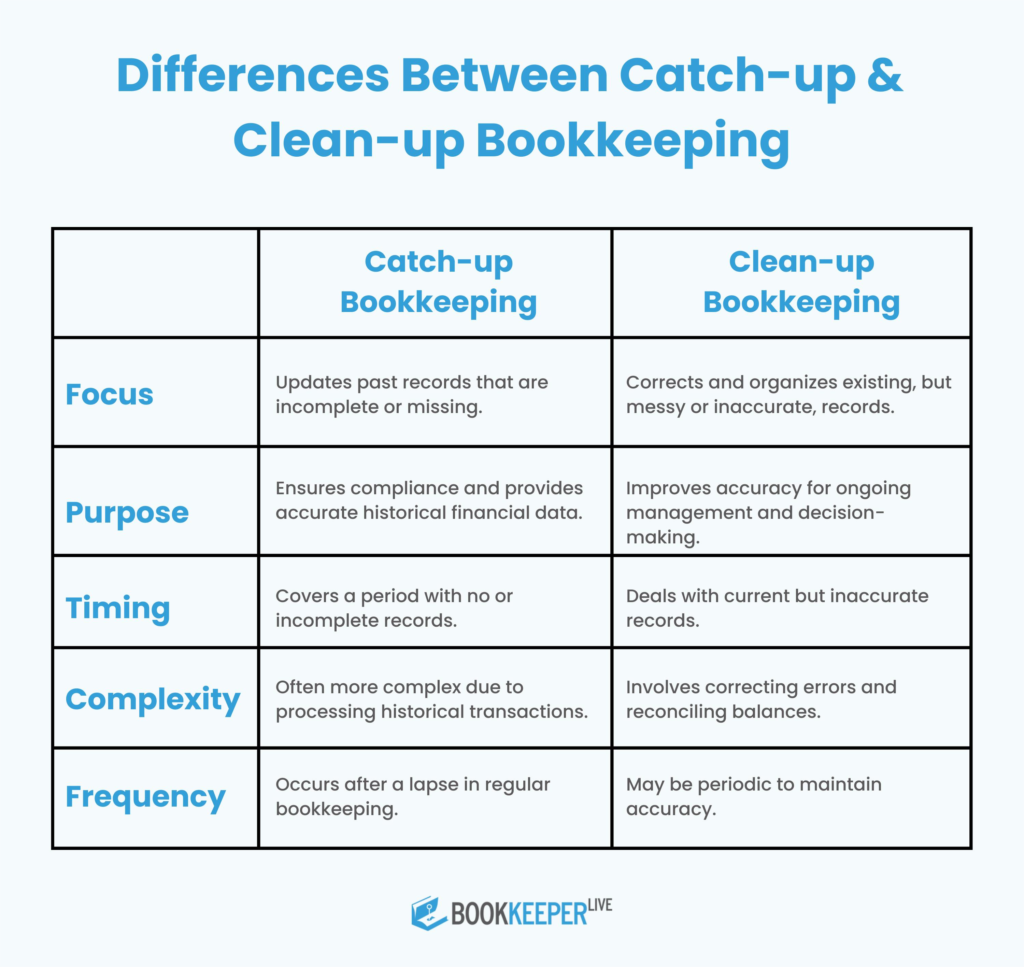
A recent study revealed that a significant 72% of small business owners struggle with catching up on their bookkeeping. If you're buried under piles of receipts and bank statements, you're not alone! Tackling this project, can feel incredibly daunting. But taking the time to work through it isn't just about getting organized—it's about understanding your money better. Whether you're freelancing or running a small business, keeping your books in order means having accurate records and filing taxes on time, which sets you up for success in the long run. This blog post will guide you through the process of catching up on bookkeeping, helping you transform that financial Challenges. We'll break down the steps into clear, actionable tasks, so you can finally get your finances in order and achieve long-term success. Are you ready to conquer your catch-up bookkeeping project?
Catch-up bookkeeping is the solution for businesses that have fallen behind on maintaining their financial records. Whether due to being overwhelmed by other tasks, lacking experience, or prioritizing other aspects of business development, the aim of catch-up bookkeeping is to bring your records up to date. This process involves identifying and correcting any errors, ensuring compliance with tax requirements, and providing a clear view of your business's financial status.
Engaging in catch-up bookkeeping allows you to assess the overall financial health of your business. It can uncover neglected areas that require immediate attention and highlight inefficiencies that may have hindered your business growth. While proactive and regular bookkeeping is ideal, catch-up bookkeeping serves as a crucial remedy, particularly beneficial for small startups facing initial challenges.
Catch-up bookkeeping might seem like a chore, but it's a crucial step for any business, regardless of size or industry. Here's why getting your books in order matters:
1. Accurate financial picture: Imagine making business decisions based on blurry financial data. Catch-up bookkeeping gives you a clear picture of your income, expenses, and overall financial health. This allows you to make informed choices about resource allocation, investments, and pricing strategies.
2. Tax time savior: Tax season shouldn't be a frantic scramble. Catching up on your books ensures you have accurate records readily available. This saves you time, reduces stress, and minimizes the risk of errors that could lead to penalties or audits.
3. Identify areas for improvement: A clean set of books reveals areas where your business might be overspending or underperforming. You can identify spending leaks, discover profitable ventures, and optimize your financial processes for better cash flow.
4. Secure funding or loans: If you're looking for investors or applying for loans, having up-to-date financial statements is essential. Catch-up bookkeeping demonstrates financial responsibility and transparency, making a positive impression on potential lenders or investors.
Beyond the basics: Catch-up bookkeeping isn't just about compliance. It's about gaining valuable insights to propel your business forward. By understanding your financial history, you can forecast future trends, set realistic goals, and make data-driven decisions that pave the way for sustainable growth.

By following these steps systematically, you can effectively manage your catch-up bookkeeping process and maintain financial transparency in your business operations.
These steps will help you manage your finances more effectively and avoid problems down the road.
Catching up on your bookkeeping may seem difficult, but it's a necessary step to financial clarity and business success. By following the steps and tips outlined above, you can transform your financial data from a disorganized mess into a powerful tool for informed decision-making and future growth. Remember, prioritizing your bookkeeping and maintaining accurate records is an investment in the long-term health and prosperity of your business.
You can empower yourself further by taking advantage of expert guidance. Our team of experienced bookkeepers can provide personalized advice to ensure your catch-up bookkeeping is accurate and efficient. For a limited time, we're also offering a free trial so you can experience the benefits of professional bookkeeping firsthand. Don't wait any longer to take control of your finances and unlock the full potential of your business.
1. Is this a one-time catch-up, or do I need an ongoing bookkeeping solution?
This depends on your business needs and preferences. If you're dealing with a backlog of transactions or financial records, a one-time catch-up may suffice to bring everything up to date. However, for ongoing clarity and compliance, especially as your business grows, implementing an ongoing bookkeeping solution is often recommended. This ensures timely and accurate financial reporting, helps in managing cash flow effectively, and provides insights for making informed business decisions. Ultimately, the choice between a one-time catch-up and ongoing bookkeeping depends on your business goals and the complexity of your financial operations.
2. What are my financial goals for catching up?
1. Accuracy: Ensure all your financial transactions (income and expenses) are correctly recorded.
2. Completeness: Capture all your business's financial activity for the neglected period.
3. Organization: Get your records categorized and easy to understand.
By achieving these goals, you'll gain a clear picture of your financial health and avoid issues like missed tax deductions or inaccurate cash flow calculations.
3. What are the benefits of catching up?
Improved financial awareness, smoother tax preparation, reduced errors, and better decision-making for your business.
4. Should I outsource catch-up bookkeeping?
Consider outsourcing if you feel overwhelmed or lack the time. A bookkeeper can get you caught up quickly and set up a system for the future.
BookkeeperLive provides affordable bookkeeping and accounting services tailored to your business goals.





No calls, No meetings, No spam. Get started with a free trial by filling out the form.
*NDA included for your data protection.
Copyright © 2025 BookkeeperLive. All rights reserved. Privacy Policy Terms of Use
Please visit our India site to see services designed for your country
Enter the code, fill out the form, and unlock financial clarity with a free trial.